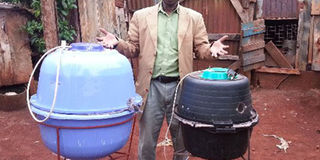My simple incubators from basins and blanket

David Macharia with the incubators he makes at his home in Nyeri.
BONIFACE MWANGI| NATION
What you need to know:
- Many of the residents in Kamuyu are squatters and have been struggling to get title deeds for years.
- To assemble one incubator, with all the materials with him ready, Macharia notes that he only takes three hours.
- He regulates the temperature of the incubator at a maximum of 39 degree Celsius and a minimum of 37 degrees Celsius.
- Doris Wambui, a livestock production officer from the Ministry of Agriculture, Nyeri, says Macharia’s ingenuity is what small farmers need to boost their businesses.
Kamuyu is not one of the popular areas in Nyeri, perhaps because there is little that is spectacular about it.
The area, which is about a 20-minute drive from Nyeri town, is dotted with small houses, some made of concrete, others iron sheets while the rest timber.
Many of the residents in Kamuyu are squatters and have been struggling to get title deeds for years.
I am in Kamuyu this Tuesday to meet poultry farmer David Macharia, who makes simple electric incubators from plastic basins and blankets that he uses to hatch eggs in a thriving agribusiness.
I find Macharia busy piecing together a modified electric incubator from two plastic basins for a client.
He has been doing the work for close to three years. But for him, this is his part-time job as he normally puts more attention to it when someone has placed an order.
Besides blankets and basins, he uses a fan, thermostat, thermometer, two bulbs and a coffee tray wire to make the gadgets.
“The blankets help in absorbing moisture and retaining warmth in the incubator while the two 60 watt bulbs are for providing warmth,” says Macharia, adding that using bulbs with low voltage helps to minimise power usage, thus reducing the electricity bill.
Regulating heat
The thermostat, on the other hand, is for regulating heat automatically inside the incubator while the coffee tray wire is for holding the eggs.
Inside the incubator, Macharia places a small basin that contains clean cold water to provide oxygen as the fan regulates the heat inside.
The two plastic basins lined up with blankets, one on the base which hosts the coffee tray wire and the small basin with water, and the other which acts as a cover have small ventilations that also allow air into the incubator.
To assemble one incubator, with all the materials with him ready, Macharia notes that he only takes three hours.
He regulates the temperature of the incubator at a maximum of 39 degree Celsius and a minimum of 37 degrees Celsius.
“My incubators have a capacity to hold 60 and 110 eggs. I sell the 60 one for Sh15,000 while that of 110 goes for Sh35,000.”
The father of four, who is also a plumber says, he borrowed the idea from a firm based in Kikuyu, Kiambu County, which used to sell incubators.
“I used to work at the firm in 2004. It was importing incubator-making materials from China and our work was to assemble them.”
When he started, things did not go well because the gadgets were not working.
“After trying for almost one year, I managed to come up with the small 60-egg capacity incubator that only hatched five chicks,” he recalls, adding he has a breeding stock of 60 Kari Kienyeji chickens, with 12 of them being cocks.
He almost gave up but later decided to improve it and after three months of struggling, his incubator was able to hatch 70 per cent of the 60 eggs.
“I am happy that I have made the incubator but my main challenge is modifying it to turn the eggs automatically. I am working on it. For now, I normally turn them manually twice a day. And to avoid leaving others unturned, I mark them using a pencil.”
In a good month, Macharia makes about five 60-egg capacity incubators.
Doris Wambui, a livestock production officer from the Ministry of Agriculture, Nyeri, says Macharia’s ingenuity is what small farmers need to boost their businesses.
She notes that it is always difficult to regulate heat using plastic materials but Macharia has beaten the challenge by using pieces of blankets, water and fans shows he is resourceful.
“I must admit that the farmer has done something great because I have seen his incubators hatch as any other. Most factory-made incubators are expensive, this is welcome.”
Creation of jobs
Apart from selling the gadgets, Macharia, 58, hatches chicks for sell using three incubators that he made himself.
He sells each chick to farmers at Sh70 for day-old Kienyeji chicks while those of Kenbrow breed (he buys the eggs to hatch), go for Sh100.
He also charges Sh50 for every chick hatched in his incubator for farmers who seek hatching services.
“How many eggs will hatch, from my experience, depends on the way one handles them and the number of days they have stayed since they were laid. Four-day eggs only take 19 days to hatch while those of more days than five take 21 days,” he offers, adding that each cock should serve about seven hens.
Macharia says his idea is not meant to benefit him alone, but he wants to help the youth from his village earn a living by making such incubators and hatching their own chicks for sale.
“Kamuyu is known for crime, and whenever they go seeking for jobs, no one in Nyeri County is ever willing to employ them. I hope to transform young people in this village to be respectable people,” says Macharia, who is working with three youths and has exhibited his gadgets at Wambugu farmers’ centre.
His business has picked up because many people, especially retirees and youth, are keeping chickens.




